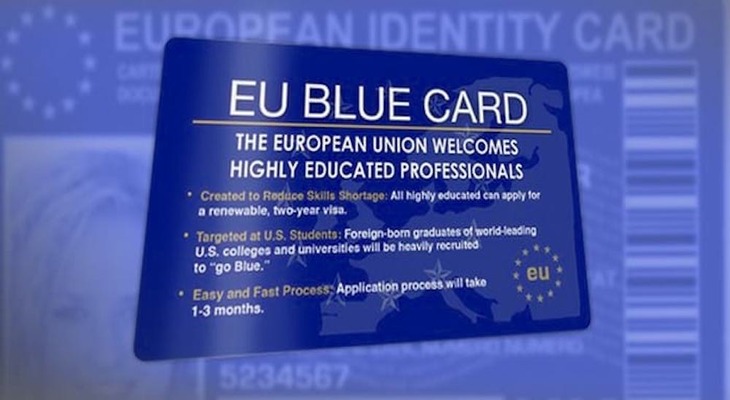
The European Parliament has recently announced changes to the rules for obtaining the EU Blue Card.
Parliament provisionally agreed to the revision, originally proposed in 2016, in May 2021. It is now awaiting final approval.
The new rules are being introduced to attract more highly skilled workers to Italy and other participating EU nations.
Read on to find out who can apply for an EU Blue Card to work in Italy, and how the latest changes to the eligibility criteria.
What is the EU Blue Card for Italy?
The EU Blue Card is a special permit for highly skilled workers from non-EU nations. It gives the holder the right to live and work in an EU country.
The EU Blue Card applies to Italy and 24 other EU countries (it does not apply in Denmark and Ireland).
To be eligible, workers must have higher professional qualifications, such as a degree, and a job offer that meets the minimum salary threshold.
The EU Blue Card is specifically for professional work purposes. Foreign nationals who wish to study in Italy require a different type of Italian visa. Tourists do not qualify for this permit either. Visitors need either a tourist visa or, from 2026, an ETIAS visa waiver to go to Italy for leisure purposes.
EU Blue Card for Italy eligibility criteria
To be granted an EU Blue Card to live and work in Italy, foreigners must meet the following requirements:
- Have proof of higher professional qualifications, such as a university degree
- Work as a paid employee. Self-employed individuals and entrepreneurs are not eligible for the EU Blue Card
- Receive a gross annual salary at least one and a half times the average Italian salary
- Have a work contract or binding job offer in Italy for at least one year (to be reduced to 6 months, see below)
- Have the required travel documents including health insurance
- Prove they fulfill the legal requirements to practice the profession, if regulated
What are higher professional qualifications for EU Blue Card applicants?
Higher professional qualifications are post-secondary higher education studies that last for at least 3 years.
Evidence that the course was successfully completed by the applicant is required in the form of a diploma, certificate, or other formal qualification.
The educational organisation that issued the qualification must be recognised as a higher education institution.
Some European Union member states accept 5 years of relevant professional experience instead of studies. However, this does not apply to Italy.
Changes to EU Blue Card requirements for Italy
As mentioned above, changes to the EU Blue Card rules will make it easier for highly skilled workers to take up employment in Italy or another European country.
Italy EU Blue Card applicants will now need a:
- Valid work contract for 6 months instead of 12
- Salary between 1 and 1.6 times the average gross salary in Italy
As well as making it easier to obtain an EU Blue Card, the new rules will also make it a more attractive option for third-country nationals by allowing:
- Cardholders to move to another EU country after working for 1 year, accompanied by their families
- Refugees and asylum seekers to apply for an EU Blue Card in other EU countries, not just the one where they live
How to apply for an EU Blue Card for Italy
To obtain the EU Blue Card, the worker or employer must submit an application to the competent authorities in Italy.
The application for, and all the relevant supporting documents, must be presented to the authorities for review. Applicants receive a decision within 90 days.
Reasons why an EU Blue Card application for Italy could be rejected
Applications will be rejected if the worker does not meet the conditions set out above. The EU Blue Card will also be refused if the individual represents a threat to public health or security in Italy.
Other grounds for EU Blue Card refusal include:
- An Italian or EU worker, or a non-EU citizen already in Italy, could fill the job vacancy
- The worker’s home country lacks qualified people in their sector
How long can workers stay in Italy with an EU Blue Card?
EU Blue Card holders are normally able to stay and work in Italy for between one and 4 years. Provided all the conditions are still met, the permit may be renewed for the same length of time.
Holders of an EU Blue Card can enter and re-enter Italy. It can also be used to stay in the other EU Member States for a maximum of 3 months in a 6-month period.
After 18 months (soon to be reduced to 12) workers can move from Italy to another EU country to work. They must apply for a new EU Blue Card in that nation.
EU Blue Card for Italy and changing or losing jobs
The EU Blue Card Holder must stay in the job for which they were issued the card for 2 years unless they have special permission from Italian authorities. After these initial 24 months, employees may be free to change jobs.
EU Blue Card holders who lose their job must find a new one within 3 months. After this time, the permit may be withdrawn and they could be required to leave Italy.


